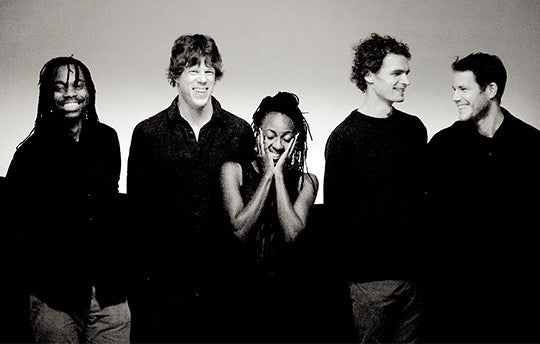Your Cart is Empty

World Music Network is pleased to announce the release of Monoswezi Yangaon Riverboat Records on 25 May 2015. The album is Monoswezi's second release, their succesful debut The Village came out in 2013.
 Monoswezi weave traditional African songs and instruments with cool Scandinavian jazz. Zimbabwean mbira and vocals are enriched with Mozambican percussion and embellished with Nordic sax and sympathetic rhythm section.
Monoswezi weave traditional African songs and instruments with cool Scandinavian jazz. Zimbabwean mbira and vocals are enriched with Mozambican percussion and embellished with Nordic sax and sympathetic rhythm section.
Listen to the album or order it here!
Monoswezi bind themselves together on Monoswezi Yanga, gently singing reworked folk songs and whispering vivid tales. Hope Masike’s dulcet tones guide the album. She assumes the role of storyteller, underpinned by smooth unobtrusive accompaniment. As listeners we are invited to gather round, to sit at her feet soaking up the illuminated myths and legends of her childhood.
Monoswezi Yanga is the group’s second album on Riverboat Records, following the critically acclaimed 2013 release The Village. The recording took place at bass player Putte Johander’s home studio on the Koster Islands in Sweden. The islands are remote and free from cars; the native silence is punctuated by the sound of surrounding waters lapping against rocky coastlines.
As the cosmopolitan band live across three countries (Norway, Sweden and Zimbabwe), meeting up in full is a treasured but rare occasion. Studio time is precious and experimentation the order of the day. Often tracks are laid down in one take and then post-produced by the Scandinavian-living members Hallvard, Erik, Calu and Putte. Mixes are then bounced across the globe to Hope who contributes feedback from her home in Zimbabwe. Though unconventional, this working method imprints their music with a beautifully loose and open aesthetic. The music is not over-thought or preened to pretension. The music is fluid, organic, and free.
The name Monoswezi is an amalgam of the four nationalities represented in their line-up – Mozambique (Mo), Norway (No), Sweden (Swe), Zimbabwe (Zi) – and the influence from each culture is audible. Hallvard’s Scandi-jazz saxophone approach is round of tone and melodically minimal. Putte’s bass lines are rock-solid, firming up the jazz foundations. Erik brushes and bristles his drum set with subtle swing. Calu’s percussion surges tightly below Hope’s Shona-language singing and punctuating mbira.